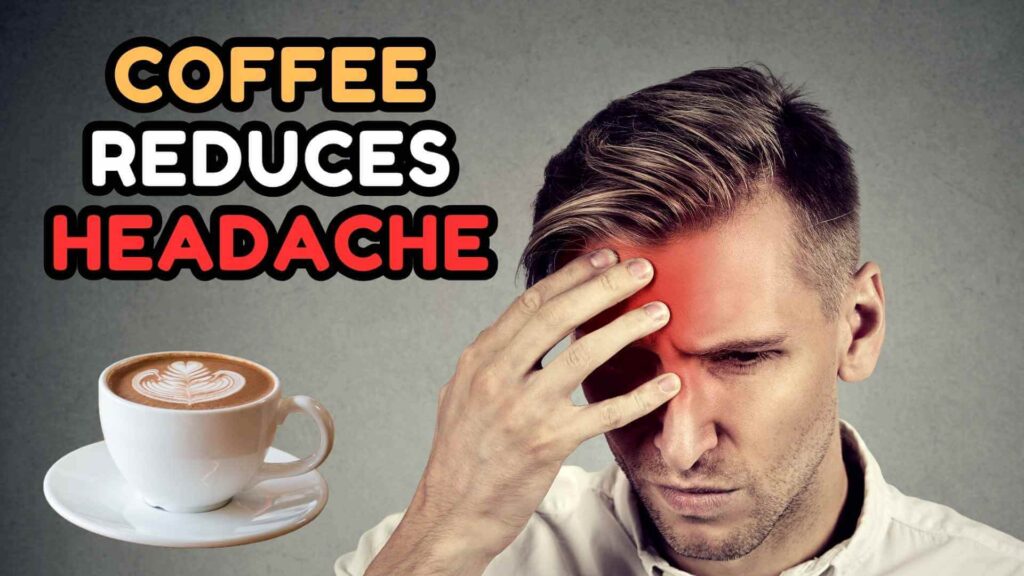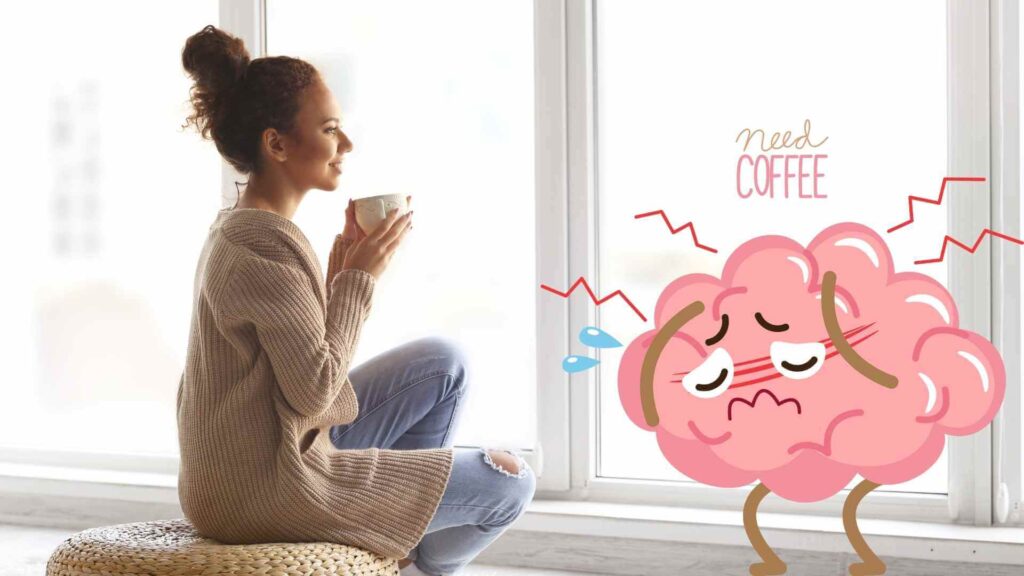Headaches are an incredibly common ailment, affecting millions of people worldwide. Whether it’s the result of stress, dehydration, or a more complex condition like a migraine, headaches can be debilitating. Among the many remedies available to treat headaches, coffee, with its caffeine content, is often a popular choice. But what exactly makes coffee effective in alleviating headache pain?
The answer lies primarily in caffeine’s physiological effects on the body. In this blog post, we’ll delve deep into the science of how coffee can be a potent ally in headache relief, exploring the mechanisms at play and how to use it effectively.

Understanding the Mechanism: How Caffeine Alleviates Headaches
The Role of Caffeine in the Brain
Caffeine, a well-known central nervous system stimulant, has a significant effect on the brain. It primarily operates by blocking the action of adenosine, a neurotransmitter that promotes relaxation and sleepiness. Adenosine acts as a natural sedative in the brain, contributing to feelings of drowsiness. When caffeine enters the system, it binds to adenosine receptors, effectively blocking their ability to induce sleepiness.
But how does this affect headache relief? By inhibiting adenosine, caffeine not only helps us stay awake and alert, but it also plays a role in modulating pain perception. This effect can lead to a reduction in headache symptoms, especially for those suffering from tension headaches or migraines.
Vasoconstriction: Narrowing of Blood Vessels
One of the most significant ways caffeine helps reduce headache pain is through its vasoconstrictive effects—the narrowing of blood vessels. Headaches, particularly migraines, are often associated with the dilation (expansion) of blood vessels in the brain. This expansion can lead to an increase in blood flow, which in turn causes pain, especially in migraine sufferers.
Caffeine, by promoting vasoconstriction, helps reduce the blood flow to the brain, counteracting the effects of vasodilation. The narrowing of blood vessels helps alleviate the pain and discomfort associated with headaches, making caffeine an effective and rapid treatment for many individuals.
Enhanced Absorption of Pain Relievers
In addition to its direct effects on blood vessels and pain perception, caffeine can also enhance the efficacy of certain pain medications. Studies have shown that when caffeine is combined with analgesics like aspirin, acetaminophen, or ibuprofen, it can improve the absorption and effectiveness of these medications. This is why caffeine is often included in over-the-counter headache medications, as it boosts their pain-relieving properties.
Caffeine essentially amplifies the therapeutic effects of pain relievers, providing quicker and more effective headache relief.
The Dual Nature of Caffeine: Friend or Foe?

When Caffeine Helps
For many individuals, moderate caffeine intake can provide significant relief from headache symptoms. Consuming a cup of coffee at the onset of a headache can help alleviate pain due to caffeine’s vasoconstrictive effects and its ability to enhance the absorption of pain relievers. This makes coffee an attractive option for those seeking quick relief without resorting to prescription medications.
In fact, studies suggest that caffeine can reduce the severity and duration of migraines when taken at the first signs of a headache. For people who suffer from chronic headaches or tension headaches, regular moderate coffee consumption may help reduce the frequency of these episodes.
When Caffeine Hurts
While caffeine can be beneficial for some, it’s not without its drawbacks. Overconsumption or reliance on caffeine can lead to several issues, particularly for those who consume large amounts regularly. One of the most significant concerns is the potential for rebound headaches. This occurs when the body becomes accustomed to regular caffeine intake, and withdrawal symptoms set in when caffeine levels drop.
Rebound headaches are a form of “medication-overuse headache,” often caused by daily caffeine consumption. When a person suddenly stops drinking coffee or reduces their intake, the body’s dependence on caffeine leads to withdrawal headaches. These headaches can be even more severe than the original headache and may last for several days. This highlights the importance of moderation in caffeine consumption.
Additionally, for some individuals, caffeine can act as a headache trigger rather than a relief. People who are sensitive to caffeine may experience headaches after consuming it, especially in large quantities. Therefore, it’s essential to understand your body’s response to caffeine and tailor your intake accordingly.
You may like buying: Keurig Coffee Makers
Recommended Caffeine Intake for Headache Relief

Moderation is key when using caffeine as a remedy for headaches. According to experts, consuming up to 200 milligrams of caffeine per day (about one to two cups of coffee) can be effective for headache relief without causing significant adverse effects. It’s essential to pay attention to your own tolerance levels, as some people may experience side effects like jitteriness, increased heart rate, or anxiety even with lower doses.
To ensure caffeine’s positive effects without the risk of dependence or withdrawal headaches, it’s recommended to keep your intake within a moderate range and avoid excessive consumption. This balance helps ensure that caffeine provides headache relief without leading to unwanted side effects or caffeine dependency.
Table: Recommended Caffeine Intake
| Age Group | Maximum Safe Daily Caffeine Intake | Equivalent Cups of Coffee |
|---|---|---|
| Adults (18 and over) | 200-400 milligrams | 1-2 cups |
| Teens (12-17) | 100 milligrams | 1 cup |
| Children (under 12) | Limited caffeine consumption | Not recommended |
The Science of Caffeine: Beyond Headaches
Caffeine’s Effects on the Brain
Caffeine’s impact on the brain extends beyond just headache relief. When caffeine is consumed, it stimulates the release of neurotransmitters like dopamine, serotonin, and norepinephrine. These neurochemicals are involved in regulating mood, alertness, and pain perception. By modulating these chemicals, caffeine can not only improve cognitive function but also reduce feelings of fatigue, which may indirectly lessen the intensity of a headache.
Additionally, caffeine’s effects on serotonin levels may contribute to its ability to prevent or alleviate migraines. Serotonin plays a crucial role in regulating blood flow and vasoconstriction, which is why caffeine’s interaction with this neurotransmitter may help alleviate migraine symptoms.
The Role of Caffeine in Chronic Headache Management
Chronic headaches, including migraines, are a long-term issue for many people. Studies have shown that caffeine’s role in chronic headache management can be beneficial, especially when incorporated into a well-rounded treatment plan. However, caffeine should not be relied upon as the sole method of managing chronic headaches, as overuse can lead to dependency and withdrawal symptoms.
Instead, caffeine can be part of a broader approach to managing headaches, including lifestyle changes, medication, and stress management techniques. Consulting with a healthcare professional to tailor a treatment plan that includes caffeine in moderation can help prevent and alleviate chronic headaches.
Conclusion
Coffee, thanks to its caffeine content, can be a powerful ally in the fight against headaches. Whether through vasoconstriction, improved pain reliever absorption, or neurotransmitter modulation, caffeine offers a multifaceted approach to headache relief. However, moderation is essential to avoid the risks of dependency and rebound headaches.
For most people, consuming one to two cups of coffee per day is a safe and effective way to reduce headache symptoms, but it’s important to listen to your body and adjust your intake based on personal tolerance. As always, it’s a good idea to consult with a healthcare professional before using caffeine as a long-term solution for headache management.



0 Comments